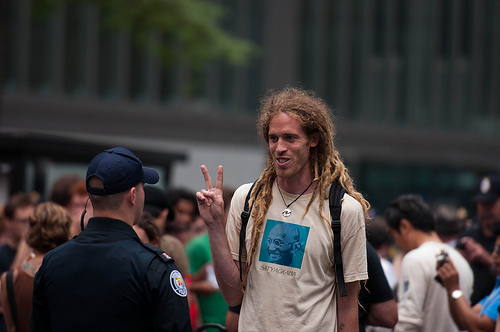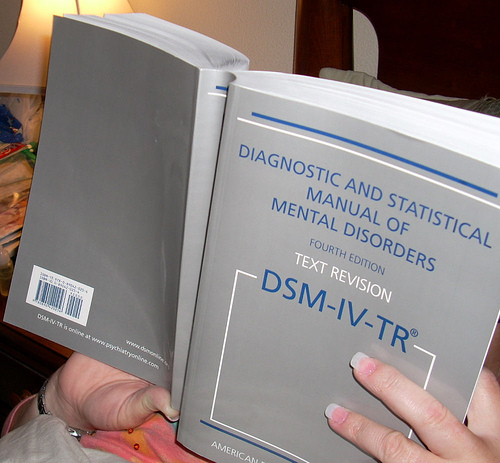Overcoming Powerlessness: How To Get a Bipolar Person Help
Bipolar people have one advantage compared to their family and friends. At the end of the day, we have the option of seeking treatment or not seeking treatment, and what kind or kinds of treatment to seek. Family members and friends of bipolar people can be in a much more difficult and often frustrating situation. Unless the bipolar person is legally incompetent, bipolar people have the right to refuse treatment. As a result, the loved ones of bipolar people are often only able to watch and are unable to act when they see that the people they love need real help.
However, there are a number of things that people can do to help bipolar people get the help that they need. Often, it is a matter of understanding why it is that the bipolar person is resisting treatment, and helping to find treatment that addresses those concerns. Two steps can help in finding bipolar people the help they may need. First, one needs to understand what help exactly is available. Second, one needs to understand what it is that is causing the bipolar person to be hesitant about getting treatment.
Learning the Options
There are a number of different options that bipolar people have when it comes to seeking help. Some of these options are treatment, strictly speaking, while others can help bipolar people to take care of some of the ways in which bipolar disorder can impact their lives in general.Note: the below all assumes that the person needing help is already aware that he or she is bipolar. For more information about actually obtaining a bipolar diagnosis, please see my article on the subject here.
Medical Help
Medical help is, in many ways, the easiest type of help to get for people with bipolar disorder. Many people with bipolar disorder function better on medication than they do when they are not on medication, and physicians can either provide prescriptions themselves or provide a referral to a psychiatrist. Most medical plans will cover physician visits or psychiatric visits, provided there is a proper referral.
Therapeutic Help
Therapy is also readily available, though it is often not covered by various health plans. In Ontario, for example, therapy is only covered by the government when it is administered by a medical doctor; other forms of therapy are simply not covered. There are different types of therapy, including cognitive behavioral therapy, psychodynamic therapy and social rhythm therapy. I have a full article about the various therapeutic options here.
Addiction Counselling
Many people who have bipolar disorder also have addictions of various kinds. Depending on what kind of addiction the person has, there are a number of organizations, many of them free, that a loved one can attend. Alcoholics Anonymous provides groups in most urban areas and Narcotics Anonymous provides support for illegal substances. One can also find a large listing of local residential treatment centers here (note: this is simply a directory of services, not accredited by any particular agency).Employment Services
Often, people with bipolar disorder have difficulty finding and holding down employment. Two options are available, depending on the seriousness of the condition. Either the bipolar person may need help finding a job or otherwise attaining disability benefits. In the United States, the government website The Work Site provides information about finding work with a disability, while the SSA’s page on disability benefits provides information about receiving disability payments.
Financial Counselling
People with bipolar disorder, sometimes due to work disruption and sometimes due to manic and hypomanic spending sprees often need financial counselling and debt services. The National Federation for Credit Counselling has a number of accredited member groups that can assist with recovering from financial disaster.
Why Bipolar People Resist Help
Once the options are understood, one is in a better position to help the bipolar people to get help. However, people who have bipolar disorder are often resistant to help, usually because of past experience that they have had. This can be very frustrating for those who are trying to help them. Usually, though, the reasons that bipolar people resist help do so for a small group of reasons. I will give some ideas here of how to help the bipolar person overcome some of those resistances.
There is one general piece of advice here that doesn’t really fit into any particular category. If someone is resistant to one form of help, one can try to get them help in another area. For instance, if someone is especially resistant to taking medication, one could try to help them seek counselling. If someone is especially resistant to fixing an employment situation, they might be less resistant if they are using more effective medications. In general, once people are receiving one form of help, they are more likely to find someone trained who can help them attain help in those areas that are more difficult for them. I will call this “Plan B” in the discussion below.
A Particularly Bad Experience

Source: Sarah G... - CC BY 2.0
The first step is to find out if a negative experience is what is actually going on. In a non-confrontational way, one can try to listen about bad experiences in the past. At that point, one can engage in a little cognitive therapy. People (not just bipolar people) tend to remember the negative more than the positive. One can engage in a conversation about any positive experiences the bipolar person has had with that sort of treatment, and think of ways that the positive experiences can be replicated. Of course, if there were never any positive experiments, it might be good to move to Plan B.
Financial Concerns
A lot of treatments are expensive, including especially uncovered medications and therapy. A bipolar loved one may not wish to discuss all his or her financial problems that might be motivating his or her decisions. Uncovering this is tricky, because we have a (usually quite beneficial) social rule against asking people about their financial situation. However, if one knows that the person is in financial straits, one should consider this as a possibility.
In such cases, there are options that are low cost or free. For instance, there are a number of peer support groups that are free and group therapy sessions that are less expensive than individual therapy. There might be government drug benefits for which they are eligible. If a physician is pushing the person to take expensive atypical antipsychotics, that person might consider another physician who is willing to prescribe generic mood stabilizers. Note that lost work time can also be a financial cost, like time in hospital.
Denial
Many people who have bipolar disorder are in denial about the seriousness of their condition. Seeking help requires becoming quite cognizant of the fact that we need help, and therefore it makes the disorder much more imminent. It is a lot easier to have (sometimes hypomanically strange) ideas about how the situation will just right itself “given time” (my big one).
Denial is one of the hardest forms of resistance to overcome, in part because there is no recourse to Plan B. Even if someone knows he or she has bipolar disorder, all overt attempts to deal with the situation are likely to be met with the same resistance.
Part of the reason that people are often in denial, though, is that they are afraid of how other people will see them once they are aware that they have bipolar disorder. If it is made clear to them that they will be supported in their bipolar disorder, and they are actually supported, then they are more likely turn to the supportive person when they need help. At that point, one can suggest some sort of a activity that both engage in. I know that in our bipolar peer support group, people often come with partners or friends who are just there to support them through the process.
Conclusion
Loving someone with bipolar disorder can be extremely hard. Friends and family can see their pain from the outside, but are unable to do anything about it directly. However, there are a number of options available, and once one becomes aware of anything that might be causing a loved one to resist getting help, one can be an important support in getting the help that he or she needs.











Leave a Reply